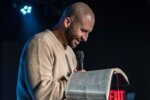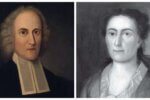All eyes will be on Greece next summer when the Olympic Games return to Athens. Thousands of Christians plan to use the event to evangelize a spiritually needy country.
Greece. It is the nation whose language God chose for communicating the gospel to non-Jews. It is the historical gateway of the gospel to Europe as well as the Americas.
But it is also the world cradle of humanism, a country with a still fertile garden of superstition and idolatry. Even the local beer is named Mythos.
Twenty centuries after the apostle Paul made history-making mission trips to Thessaloniki (Thessalonica) and Korinthos (Corinth) and eternalized the ancient cities through his letters to the Christians there, it appears the Greek ground is as rocky and shallow in the spiritual sense as it is in the natural.
Greece today is anything but a Christian country, even though 98 percent of the population belong to the Greek Orthodox Church. The evangelical, Pentecostal and charismatic churches comprise some 0.14 percent of the population, or a mere 15,000 people out of 10.5 million. Even allowing for a very generous estimate of born-again Orthodox believers, far less than one one-hundredth of today’s Greeks pay more than the faintest lip service to their proud biblical heritage.
In contrast, their nation is renowned for its language and archaeology, its olives and sheep’s cheese, its sea and archipelago–and for its contribution to international sports. It is still praised, after more than 2,000 years, as the birthplace of the Olympic Games.
The Olympics Come Home
In 2004 the Summer Olympics return here to their native soil, and at first sight they seem to be heralding the return of the mythical Olympian gods as well.
The ancient games were held in the city of Olympia to honor Zeus–held by Greek mythology to be the chief of the gods who resided upon Mount Olympus. In preparation for the 2004 games, Greek school children are being taught to sing a hymn that refers to Zeus as “our blessed father.” Zeus’ mythological subordinates, Athena and Phevos, have been appointed patrons of the games, thinly masked as “mascots.”
Despite the renewed national emphasis on mythical heritage, next year’s Olympics, spiritually speaking, spell victory to Johnathan Macris, director of Hellenic Ministries.
“The international church will focus on Greece, and there will be a global wave of prayer for our country that will release a wave of revival,” Macris, a high-profile Greek Protestant, prophesies with ardent expectancy.
He makes his statement within sight of Mars Hill, the holy place of the Greek war god Ares and the site where Paul delivered his sermon against ancient Greek superstition. It is late at night, and Macris is enjoying his souvlaki–grilled dices of chicken, with slices of green pepper and onion on a skewer–at a local café. He grabs a napkin and scribbles a sketch of his plans for “tremendous warfare in the heavenlies” timed to coincide with the 2004 Summer Games.
“I aim at mobilizing 100,000 committed intercessors,” he states fervently. “It is time for the Western church [in Europe and North America] to return a measure of the blessing it has received by way of Greece and through the Greek language.”
The Olympics, Macris claims, are critical not only to saturating Greece with the gospel–in August thousands of believers will come to Greece for evangelistic outreaches–but also to reaching the 1.2 billion Muslims in the Asian countries that lie between Athens and Beijing, the host city of the 2008 Olympics.
Macris views the Olympics as a step toward a unified worship of the Antichrist as outlined in the biblical book of Revelation, which was written on the Greek island of Patmos. The worship of idols, and of man, is a fundamental element of the world’s most famous sporting event. The 2004 Games, Macris believes, will be the largest event of idol worship in world history to date.
But God’s plan, he adds, is to mobilize an army of intercessors to pull down the “[spiritual] stronghold over Greece” for the purpose of opening the door to evangelism in the country. He believes God’s plan also includes preparing the way for the Holy Spirit to move, on a grander scale than ever, across the Bosporus Strait–a recognized boundary between Europe and Asia–into Turkey and farther into the heartland of Islam.
Icons and Traditions
The Greek Orthodox Church is one of the oldest church bodies. Some 1,500 years ago, under Orthodox hegemony in what is today Turkey, Christianity’s basic tenets were reasoned out and made theology.
However, a seed of civil oppression–the state-church concept–was planted as well and developed in the same context. It later was inherited by both the Roman Catholic Church and the Lutheran Church and provided the moral basis for genocidal operations that included the Crusades and the Inquisition.
In Greece the Orthodox Church is overtly favored, and the Protestant churches are viewed not only as religious sects but also as enemies of the state. Macris’ personal experience of Greek orthodoxy is one of persecution and ongoing harassment. “I have been beaten, kicked, spat upon, and of course verbally abused over and over again,” he told Charisma.
Between 1984 and 1986, Macris’ father, Costas Macris, together with Youth With A Mission (YWAM) leaders Don Stephens and Alan Williams, were tried twice in Greek courts on charges of proselytism–a criminal offense–and sentenced to 3.5 years in prison. A young Greek had become a believer through YWAM staff who later introduced him to Costas Macris.
The young man’s mother sued. After considerable international pressuring, an appeals court acquitted the three Protestants.
The anti-proselytism law is still in force, but church leaders and missionaries told Charisma that the government currently takes little action–although the general mentality of the Greek Orthodox Church and the public remains strongly anti-Protestant.
Timotheos Antoniadis of Thessaloniki, who pastors a typically small Protestant church, says the authorities continue to thwart his plans to spread the gospel.
“We are simply ignored,” he says of attempts by his church to obtain a permit to conduct street outreaches. But such problems, he says, can be circumvented.
“The real problem is that the Greek are very skeptical toward non-Orthodox churches,” he explains. “The perception of Protestants as a threat is a [spiritual] wall that we need to breech!”
Antoniadis’ congregation attempts to break this stereotype by reaching out to the needy, the poor, the prostitutes and the immigrants. In the last four years, the average Sunday attendance at his church has doubled from 20 to 40. Most of the new attendees, including Russian-speaking converts, belong to socially marginalized groups.
Jorgos Patsaouras, pastor of the Foursquare Apostolic Church of Christ in Athens, the most-attended Protestant church in Greece–with some 700 Greek members–tells the same story about religious liberties and church growth.
“Our problem is presently not with the government but with the culture. It is still difficult to plant churches in the countryside because of the cultural pressure against all things non-Orthodox,” Patsaouras explains.
“But in Athens,” he adds, “we have seen more converts than ever in the last two years.”
The Athens church, like the one in Thessaloniki, has witnessed its fastest growth among immigrants. Patsaouras currently oversees a Bulgarian congregation of some 100 attendees as well as smaller Russian, Albanian, Sri Lankan, Iranian, Romanian and Spanish-speaking congregations. He also embraces any marginalized people.
“Our approach is to address the felt needs of people, reaching out to the sick, the poor, the alcoholics and other addicts,” he says.
Dimitris Grigoriadis, 42, told Charisma during a Sunday-morning service in the Apostolic Church of Christ that for most of his life he was “addicted to sex, guns and bikes.” He described himself as “incapable of faithfulness.” For him, there were always prostitutes and pornography.
“I was also very violent and used my karate and my guns to solve all problems. The [motorcycles]–well, there is nothing wrong with bikes, but to me they were idols,” Grigoriadis recalls.
In 1997 Grigoriadis got into trouble and needed legal advice. His mother sent him to Patsaouras, who at the time was still a practicing lawyer.
“He helped me and also suggested I should come to church, saying: ‘What is the worst case? That you waste a few hours!’ So I went, and after six years I am still around.
“The preaching always seemed to deal with my life, and I felt its power,” he adds. “Also, people in the church accepted me in spite of my looks and manners. Remember, I was still a black-leather, guns and bikes guy.
“Soon my life started changing. I dumped the porno videos and magazines and stayed clean. After some time I sold all the guns and bikes and gave the money to the church.”
About 18 months after his conversion Grigoriadis married. “The change in my life is a powerful testimony to old friends,” he says.
Vasiliki Tsakou, 32, another recent convert in Athens says that God “numbed” her brain 2.5 years ago to make her listen. “I had absolutely no interest in God or religion. I was a macho in a woman’s body, dressed up in army clothes, and an active communist,” she explains.
Tsakou calls her own conversion “strange” but says her life as a Christian is a thrilling adventure. “I used to see satanic pictures in my mind. Now I see beautiful pictures. I was deep in debt. Now I am about to purchase a farm with my own money. I used to be afraid of Turks. Now I want to learn Turkish and start [sharing Christ with] Turkish Muslims.”
A Unique Opportunity
Currently the most successful church outreach to teenagers and college-aged Greeks is Orthodox. In Thessaloniki, the charismatic congregation Metamorphosis (“Transfiguration”) gathers 250 to 300 young Greeks for vibrant weekly worship services. Its youth group numbers 50 to 60.
It has suffered such persecution from the Greek Orthodox Church that it actually changed its name a few years ago–but it keeps defining itself as an “Orthodox community.” Members receive the sacraments of baptism, marriage and communion in the Orthodox Church and attend traditional Orthodox services in addition to the Metamorphosis meetings.
Nikos Katikaridis, a Metamorphosis worship leader–who also is an art professor at the Thessaloniki University and holds a master’s in missiology from an Assemblies of God college in Great Britain–attends Orthodox Mass only occasionally, but he says it would be a mistake to go against the Orthodox Church.
“Killing orthodoxy would be like killing our land,” he says. “The Greek feel secure in orthodoxy, and there is no changing it.”
But Katikaridis’ reasoning goes beyond pragmatism. He claims that there is a depth to orthodoxy that is lacking in most places. Even some of the current revivals, the missiologist believes, are “miles wide, but no more than an inch deep.” By contrast, he says, orthodoxy is “an inch wide, but miles deep.”
Katikaridis believes that the rich, mystical symbolism of Orthodox liturgy, and its icons, will have a place in Greek churches in the future. “Even though Metamorphosis may look like any charismatic congregation, symbolism stays with us and characterizes our relationships to God and to each other,” he says.
Dimitrios Christidis, professor of ancient Greek literature at Thessaloniki University and a co-founder of Metamorphosis in 1974, concedes that “much of the Orthodox symbolism has been blurred through time and has even been turned into idolatry in some places–but that is not the original idea.”
Christidis points out that “orthodoxy is closer to the charismatic than to the evangelical–its symbolism parallels the prophetic.”
Both Katikaridis and Christidis suggest pointing the Greek people toward the living roots of Orthodox faith rather than judging the ancient church’s dead branches. “Revival will come by planting many, many small charismatic Orthodox fellowships all over Greece,” Katikaridis adds.
An Olympic Challenge
In the meantime, Protestant believers are preparing to reach as many Greeks as possible during the 2004 Olympic Games. Johnathan Macris’ Hellenic Ministries will send evangelistic teams to 80 Greek islands. The U.S.-based True Love Waits ministry will celebrate its 20th anniversary in Athens during the Games. The international Youth With A Mission ministry will send 3,000 young evangelists throughout the Olympic cities.
“We are partnering with some 70 other organizations for the Olympic outreaches, and together we are expecting a total of 12,000 participants from all over the world,” YWAM chief organizer Jerry Winter *(not his real name) told Charisma.
“The Greeks aren’t open to invasive evangelism, so the focus will be on one-to-one friendship evangelism,” Winter says. “We are also offering our volunteer services to the Olympic organization.”
Winter, a Greek-American, made 13 trips to Greece with YWAM before moving to Athens with his family in July. He believes there will be “great possibilities to present Jesus” during the Olympics.
“Churches and ministries make the mistake of thinking that because Greece is not a religiously free country the people are closed,” Winter points out. “The Greek are not free, but they are open, and seeking God.”
To prepare the way for the Olympic campaigns, YWAM will convene a prayer summit 110 miles northwest of Athens, in Delphi, October 12-15. YWAM President Frank Naea; his successor, John Dawson; and Cindy Jacobs, president of Generals of Intercession, are among the leaders expected to attend the summit.
YWAM European Director Jeff Fountain says the summit is expected to be a chance “to compare [Greek thinking] with the biblical worldview” and “to seek the true God” through intercession and worship.
Christians worldwide, he adds, “should not take lightly the profound influence of Greek thinking on global culture and the spiritual realities of our world.”
Today, as in the past, the Greek church is resistant to change
Greece–including most of its Protestant churches–are so deeply conservative that changing the norm is eyed with suspicion.
“The Orthodox countries in east Europe seek change since they were liberated from communism in 1989. Orthodox Greece does not want change,” says a missionary who chose not to be identified for security reasons.
“The Protestants have doubled since the 1980s. But the fastest-growing movement, though Pentecostal, is so conservative that it does not allow any [musical] instruments in church, and the women must wear scarves,” he observes.
“Also it views itself as the only true church in the country. I believe that legalism feels familiar to the Greek and is therefore attractive.”
Aspects of this deeply rooted conservatism have added an air of predictability to the society. “All Greek restaurants offer the same food, and you always find the owner at the cash desk–he would not trust anybody with the money. And in the churches the pastors tend to pull the strings,” he points out.
Jean Morgan, an American Assemblies of God missionary to Greece since 1994, and the founding director of the Hellenic Theological School (HTS) in Athens, is also challenged by the Greeks’ resistance to change. Greek Pentecostal pastors do not actively support Morgan’s ministry even though they are good friends with him on a personal level.
“Each pastor wants to run his own training program,” Morgan says. He believes God will use immigrants to stir the church in Greece. Most students at HTS are foreigners.
“The churches here are not yet prepared to receive new brothers and sisters,” Morgan told Charisma. “If the Spirit moved today there would be many stillbirths. Who are the ones preparing? The immigrants.”
Tomas Dixon is Charisma’s European correspondent. Based in Sweden, he traveled to Greece in May to file this report.






Leave a Comment
You must be logged in to post a comment.